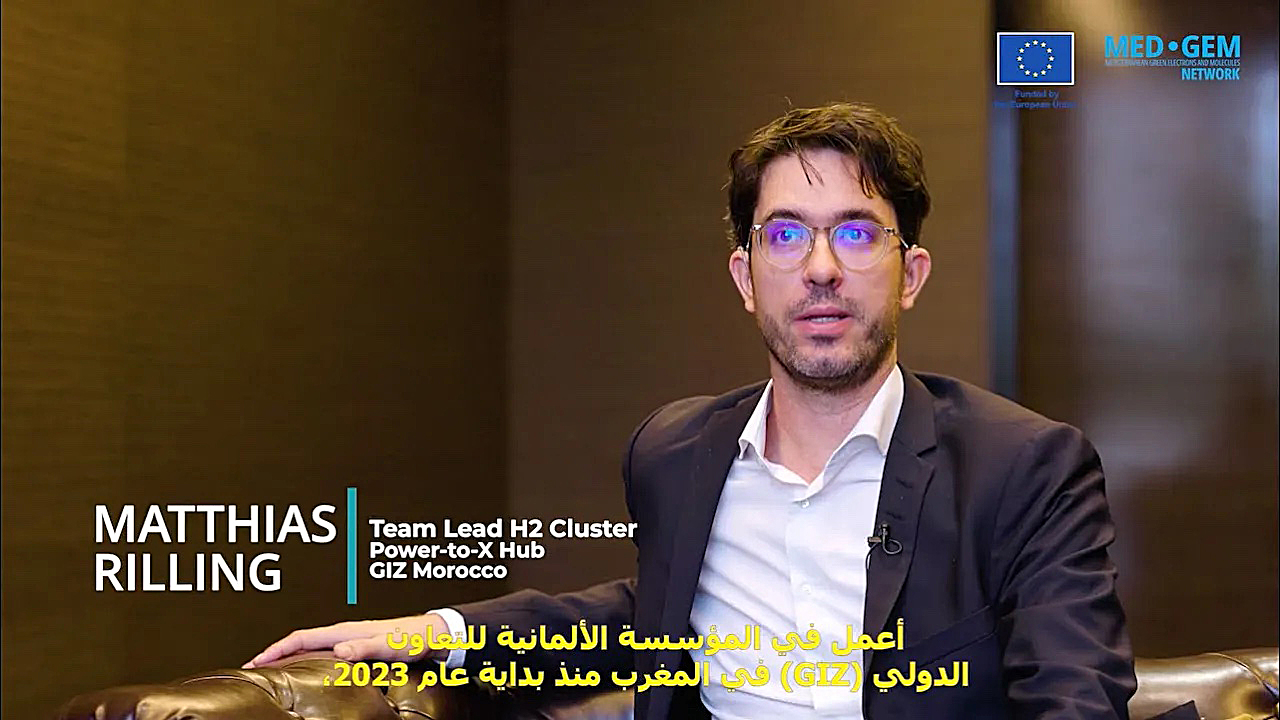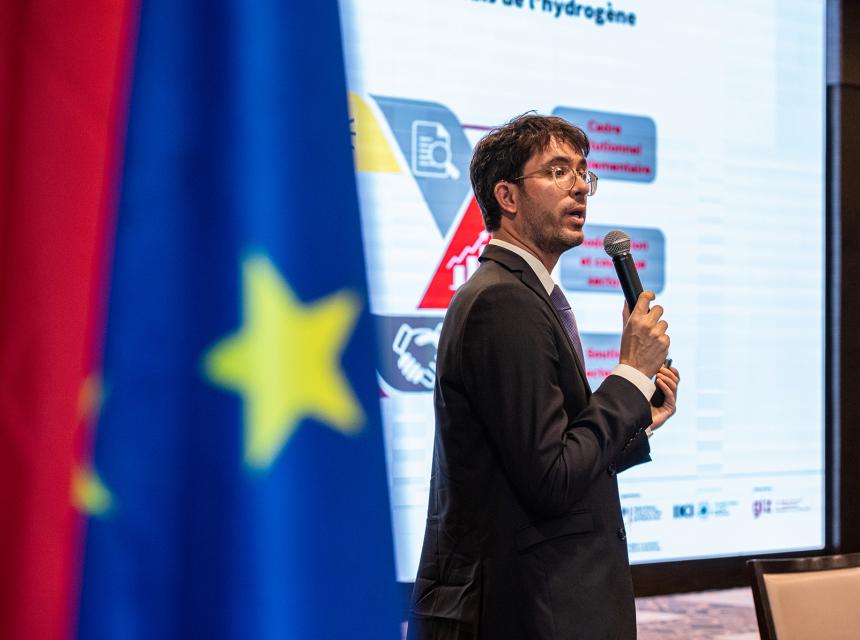Shaping the Future of Green Hydrogen in Morocco: GIZ's collaborative approach to innovation and sustainability - An interview with Matthias Rilling, Team Leader of H2 Cluster and Power-to-X Hub, GIZ Morocco
In this exclusive interview with the MED-GEM Network, Matthias Rilling, the leader for Africa and the Middle East within the GIZ's International Power-to-X Hub in Morocco since 2023, shares his insights on key initiatives aimed at promoting the hydrogen sector in Morocco. From regulatory frameworks to training and support for industrial projects, discover how GIZ and the PtX Hub contribute to shaping a sustainable energy future in close collaboration with Moroccan partners. In the conclusion of his interview, Rilling discusses the interactions and collaborative projects between the MED-GEM Network and various stakeholders in the hydrogen sector in Morocco and Europe. Initiatives such as hackathons are being considered to stimulate innovation and encourage collaboration between students and professionals.

Could you provide our audience details about the structure of your work?
Given GIZ's project-oriented organization with specific goals and strengths, there's a coordination effort to ensure coherence in our activities with Moroccan and external partners, and that's my role. We have three main projects covering the program and points agreed upon in bilateral negotiations between the Kingdom of Morocco and the Federal Republic of Germany.
What are the main focus areas in Morocco?
Firstly, there's regulatory support since hydrogen is a new sector in both Europe and Morocco, requiring legislation and regulation. Secondly, a crucial aspect for GIZ is supporting Morocco in integrating sustainability into its development, fostering social acceptance, and establishing common standards between Europe and its partner countries. Thirdly, there's a focus on infrastructure due to potential new trade between Morocco and other countries, requiring adaptation for hydrogen and its potential derivatives.
How does GIZ support the hydrogen sector in Morocco?
We have various projects, such as the Power-to-X Hub, BMZ's bilateral cooperation, and the Hydrogen Ramp-Up Programme (H2Uppp), aiming to facilitate support to the private sector. This includes funding for pre-studies and addressing a crucial element – off-taker matching between Moroccan investors and European off-takers. This is fundamental for project financing and real investment, ensuring a secure market for the next ten to fifteen years to facilitate industrial sector establishment.
Regarding training, what initiatives are in place?
Establishing an industrial sector also requires appropriate training since it's a new sector, necessitating new skills not currently available in the Moroccan job market. We're involved in facilitating the setup of Master's or post-doctorate programs in Moroccan universities, aiming to provide highly qualified personnel. Additionally, we emphasize technical training essential for the operation of Power-to-X plants and hydrogen refineries, catering to the needs of upcoming chains in Morocco in the coming years.
Could you specify what a Student engineer about GH2 could expect today?
Today, an engineer or a student passionate about Power-to-X can indirectly benefit from GIZ's efforts. Through the training provided by trainers in Morocco, several "Power-To-X Trainings" have been conducted. Through their institutional affiliation, students could participate in these training sessions.
Through their affiliation with an institution, such as a university, they could also benefit from study trips. We're also launching a Power-To-X competition, where motivated students and engineers can submit projects. The winners of the competition will have the opportunity for an extended study trip to Germany.
Interesting! And for Moroccan industrialists, what would be the opportunities ?
Today, a Moroccan industrialist could benefit from GIZ's support through various channels. Firstly, there's the "Business Opportunities Analyzer" developed by GIZ and the P-t-X Hub. This tool provides an initial cost analysis for industrial or commercial chains involved in hydrogen production and its derivatives in Morocco, along with market prospects in Europe for ammonia or methanol, depending on the production region in Morocco. This primarily addresses the pre-project phase.
What about projects already in progress or in the startup phase?
Regarding more concrete support, it mostly involves public-private partnerships. In essence, this entails equal funding from the industrialist and the public part provided by GIZ to finance pre-feasibility or feasibility studies on a project. Additionally, across all projects, we emphasize off-taker matching to ensure European markets are well-informed about industrial and regulatory developments in Morocco, seizing the opportunity as studies consistently show Morocco as the most attractive producer for Power-to-X. Our goal is to assist both Morocco and Europe in making this endeavor a reality.
In conclusion, I'd like to emphasize that our activity is conducted in close collaboration with our Moroccan partners. We engage in the entire hydrogen value chain, from establishing regulatory frameworks and infrastructure to supporting the private sector and vocational training. Moreover, we've initiated a Power-to-Liquid project in partnership.
What are the planned synergies with the MED-GEM Network ?
The MED-GEM program, supported by the European Commission and the DG NEAR, has the capacity to bring together all key stakeholders in the hydrogen sector in Morocco and Europe to address essential themes. For instance, there is significant potential for synergies in the field of education between GIZ and MED-GEM. We are considering initiatives such as hackathons, which could foster innovation and collaboration among students and professionals.
The synergies between our programs are evident in our common target audience: Moroccan students. The proliferation of initiatives is advantageous as it sustains interest in the sector and attracts diverse institutions. Some universities may be more receptive to GIZ's approach, while others may prefer the MED-GEM program. This enhances the visibility of the sector and enables us, as cooperation actors, to reach a larger number of partners effectively. By sharing our experiences, we can refine our programs and potentially initiate joint activities, benefiting both Moroccan partners and European academic institutions.
These collaborations are crucial for constructive feedback. They allow us to fine-tune our programs and organize shared activities. In doing so, we can better serve Moroccan partners and European academic institutions, who are the ultimate beneficiaries of our cooperation. In essence, these collaborations promote a better understanding and a more effective approach to addressing the needs of the hydrogen industry in the region.

